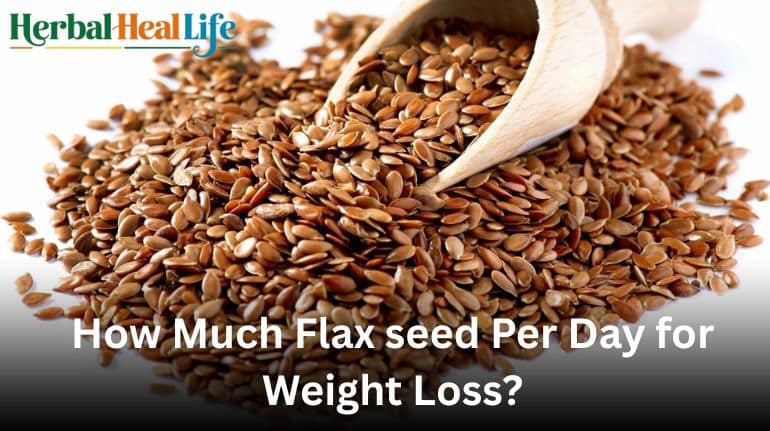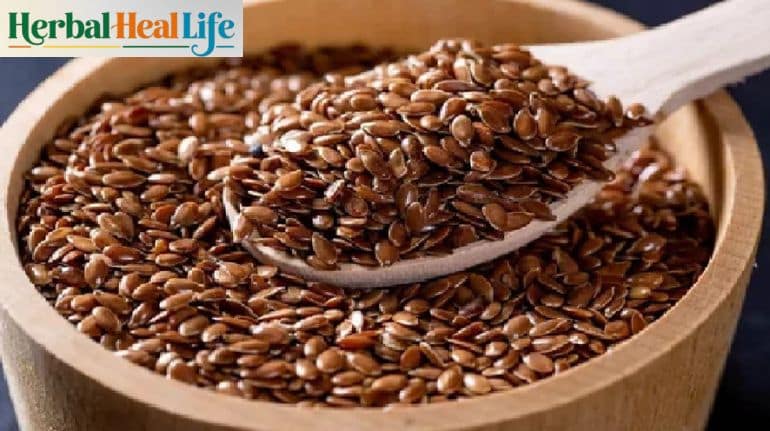Flaxseed has become one of the most talked-about superfoods today but how much flaxseed should you really eat to gain its full benefits without harming your health? Whether you’re adding it to smoothies for gut health, sprinkling it over your oatmeal for weight loss, or trying to improve hormonal balance, getting the right flax seed dosage per day is key. A common question people have is, “Can you safely include flaxseed in your daily diet? or “What’s the recommended flaxseed intake for weight loss or constipation?” The answer isn’t one size fits all.

In this guide, we’ll uncover exactly how much flaxseed you should consume based on your health goals whether it’s flaxseed for constipation relief, during pregnancy, or to lose weight naturally. Backed by scientific research and real world use, you’ll learn the safest way to incorporate this nutrient rich seed into your daily diet without overdoing it. Read on to find out how this tiny powerhouse can make a big impact on your health when taken the right way.
Table of Contents
What is Flaxseed?
Flax seed, also known as linseed, is the seed of the flax plant (Linum usitatissimum). Available in golden and brown varieties, flaxseed is consumed worldwide for its rich content of dietary fiber, plant-based omega-3 fatty acids (ALA), and lignans a type of antioxidant with estrogen like properties.

Nutritional Value per 1 Tablespoon Ground Flaxseed (~7g):
- Calories: 37
- Fiber: 2g
- Protein: 1.3g
- ALA Omega-3: 1.6g
- Lignans: 85 mg (approx.)
Whether you’re managing weight, gut health, or hormone balance, flaxseed can be a functional part of your diet when taken correctly.
How Much Flax seed Should You Eat Per Day?

Most nutrition experts agree that consuming 1 to 2 tablespoons (about 7–14 grams) of ground flaxseed daily is a healthy amount for most adults.
- Ground flaxseed is preferred over whole seeds for better nutrient absorption.
- Drinking extra water is important to aid digestion due to the high fiber content.
- Exceeding 4 tablespoons daily may lead to bloating, gas, or hormonal disruption.
How Much Flax seed Per Day for Weight Loss?

If weight loss is your goal, flax seed can help you feel full longer, reduce cravings, and regulate blood sugar spikes.
Recommended Intake:
1 tablespoon (7g) of ground flax seed once or twice daily, preferably before meals.
How it Works:
- The soluble fiber expands in your stomach, increasing satiety.
- ALA omega-3s may reduce inflammation linked to fat storage.
- Lignans may improve metabolism regulation.
Tip:
Mix ground flaxseed in a smoothie or warm water 30 minutes before meals to control hunger.
How Much Flax seed Per Day for Constipation?
Flax seed is one of nature’s gentlest and most effective natural laxatives due to its high fiber and mucilage content.
Recommended Intake:
1 tablespoon per day, taken with a full glass of water.
How it Helps:
- It works as a natural bulking agent by adding volume to the stool, promoting smoother bowel movements.
- Promotes regular bowel movements and relieves hard stools.
- Suitable for both chronic and occasional constipation (but not for diarrhea-prone IBS).
Pro Tip:
Drink it with warm water first thing in the morning on an empty stomach for the best results.
How Much Flaxseed Per Day During Pregnancy?
During pregnancy, flax seed can be both beneficial and risky, depending on the amount and how it’s consumed.
Safe Amount:
Consume up to 1 tablespoon of ground flaxseed per day, but only after consulting with your healthcare provider.
Benefits:
- Rich in plant-based omega-3s, which support fetal brain development.
- High in fiber, helping prevent pregnancy-related constipation.
- Lignans offer antioxidant benefits, though they mimic estrogen.
Important Warnings:
- High doses may affect hormone balance.
- Avoid flaxseed oil in raw form due to potential toxicity when unprocessed.
Always consult your obstetrician before including flaxseed regularly during pregnancy.
How to Eat Flax seed for Maximum Benefits
Flaxseed is versatile. But how you eat it directly affects how much benefit your body actually gets.
Whole vs. Ground Flax seed :
- Ground flax seed (flax meal) is better absorbed by the digestive tract.
- Whole seeds may pass through undigested.
Raw vs. Roasted:
- Light roasting is fine and enhances flavor.
- Don’t heat flaxseed oil excessively it loses nutritional value.
Best Ways to Eat Flax seed:
- Stir 1 tablespoon into your morning smoothie or juice.
- Sprinkle on oatmeal, yogurt, or cereal.
- Mix into homemade muffins, bread, or pancakes.
- Add to detox drinks with lemon and warm water.
- Combine with chia seeds for extra fiber.
Benefits of Eating Flax seed Daily
Whether you’re dealing with gut issues, hormonal imbalance, or heart health concerns, flax seed has something to offer.
Top Science Backed Benefits:
- Improves digestion due to its high soluble and insoluble fiber.
- Lowers LDL (bad) cholesterol naturally.
- Stabilizes blood sugar levels, beneficial for type 2 diabetes.
- Supports hormonal health due to phytoestrogens (especially for menopausal women).
- Reduces inflammation through omega-3 ALA.
- May lower risk of breast and prostate cancers (early research ongoing).
Side Effects and Precautions
Despite its benefits, overconsumption of flaxseed or consuming it incorrectly can cause unwanted effects.
Possible Side Effects:
- Bloating and gas (especially if fiber intake is too high too quickly)
- Hormonal effects from lignans if consumed excessively
- Interactions with blood thinners and diabetes medications
Avoid If:
- You have hormone-sensitive conditions like endometriosis or PCOS (consult your doctor).
- You’re taking anticoagulants (e.g., warfarin).
- You have IBS with diarrhea, as flaxseed may worsen symptoms.
Expert Tips to Make Flax seed Part of Your Routine
- Begin with 1 teaspoon daily and slowly increase to 1–2 tablespoons to let your body adjust.
- Stay well-hydrated to support proper fiber digestion and avoid discomfort.
- Keep ground flaxseed fresh by storing it in an airtight container in the refrigerator.
FAQ:
Q1: How much flax seed should I eat daily?
Most experts recommend 1 to 2 tablespoons of ground flaxseed daily for healthy adults to gain its full benefits without side effects.
Q2: What are the side effects of flax seeds?
Common side effects include bloating, gas, or diarrhea, especially if taken in excess or without enough water.
Q3: Which is better, flax or chia seeds?
Both are nutritious, but flaxseed offers more lignans and omega-3s, while chia seeds have slightly more fiber and are easier to digest raw.
Q4: How to eat flaxseed every day?
You can eat flaxseed daily by mixing ground flaxseed into smoothies, yogurt, oatmeal, or baked goods just ensure you drink enough water.

Dr. Syed Ali Hassan, an MBBS and FCPS-qualified medical doctor with over 15 years of clinical experience, our mission is to offer well-researched, science-backed content on organic remedies, natural wellness, holistic beauty, and clean living.




